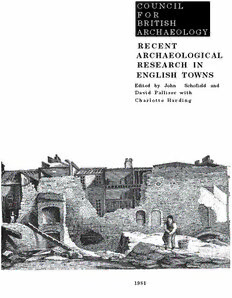
Recent Archaeological Research in English Towns PDF
138 Pages·1981·0.844 MB·English
Most books are stored in the elastic cloud where traffic is expensive. For this reason, we have a limit on daily download.
Preview Recent Archaeological Research in English Towns
Description:
The destruction wrought in our historic cities in 36 years of continuous peace (1945-81) has been far greater than anything achieved by enemy action in World War II. The pressures of redevelopment were already intensifying when Professor Buchanan produced 'Traffic in Towns' in 1963, and they reached a peak with the development boom of the late 1960s and early 1970s. Since then the pace of change has never slackened.Cities and towns are not museum pieces, and redevelopment is both necessary and desirable. What has been particularly alarming to archaeologists and historians in the last twenty years has been the pace and scale of change, which have obliterated both standing buildings and buried foundations faster than they could be adequately recorded. It was naturally the threat to visible buildings and streetscapes above ground which first attracted public alarm; and though it would be wrong to be complacent, they have been much better protected since 1968, both by legislation and by voluntary action.It was for such reasons that the Council for British Archaeology created an Urban Research Committee in 1967, with a membership drawn from archaeologists, historians, geographers and demographers. The Committee's aims were, and remain, to urge more programmes of archaeological investigation in towns; to campaign for their support by both central and local government; and to equip the new discipline of urban archaeology with a theoretical framework for research by means of seminars, conferences and publications.
See more
The list of books you might like
Most books are stored in the elastic cloud where traffic is expensive. For this reason, we have a limit on daily download.
